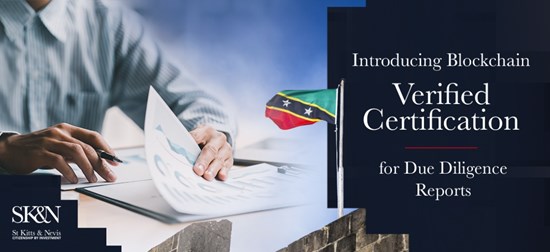+1.99%
+3.00%
+1.05%
+2.13%
+1.43%
-3.32%
The Innovation: Blockchain-Verified Due Diligence
Saint Kitts and Nevis has introduced blockchain-verified certification to its due diligence process. This advancement marks a significant leap in ensuring the authenticity and integrity of applicant background checks, utilizing immutable digital certificates for unparalleled confidence among governments and authorized entities.
What This Means
The move signifies a commitment to embracing cutting-edge technology to bolster trust and security within the Citizenship by Investment program, addressing longstanding concerns about verification integrity in the investment migration sector.
How the System Works
The Saint Kitts and Nevis CIU is now issuing unique, immutable digital certificates for every due diligence report, secured cryptographically and permanently recorded on a distributed ledger.
Core Capabilities
Tamper-Proof Records
Reports cannot be altered, forged, or misrepresented after issuance
Permanent Verification
Cryptographic security ensures lasting authenticity of each certificate
Government Confidence
Provides unparalleled assurance in the authenticity and integrity of applicant background checks
Program Protection
Significant step forward in safeguarding the program’s reputation and integrity
Technical Architecture
The blockchain verification system employs established cryptographic and distributed ledger technologies to ensure maximum security and accessibility.
Key Technical Components
Hashing Algorithm
Utilizes SHA-256 or similar algorithms to generate unique identifiers for each report. This cryptographic hash function creates a digital fingerprint of the document that changes completely if even a single character is altered, making tampering immediately detectable.
Benefits:
- Unique identification for every report
- Instant detection of any modifications
- Industry-standard security
- Computational efficiency
Distributed Ledger
Employs a permissioned blockchain to control access and maintain data integrity. Unlike public blockchains, this permissioned system ensures that only authorized entities can access sensitive information while maintaining the immutability benefits of blockchain technology.
Benefits:
- Controlled access for authorized entities only
- Privacy protection for sensitive applicant information
- Permanent record keeping
- Multi-party verification capability
Verification Process
- Report Generation: Due diligence provider completes background check
- Hash Creation: System generates unique cryptographic hash of the report
- Blockchain Recording: Hash is permanently recorded on distributed ledger
- Certificate Issuance: Digital certificate issued with blockchain reference
- Verification: Any party can verify authenticity by comparing report hash to blockchain record
Industry Impact and Global Implications
The adoption of blockchain verification is expected to significantly impact the investment migration industry by setting a new standard for transparency and accountability.
Transforming Investment Migration
Enhanced Trust
Enhances trust among stakeholders, including governments, financial institutions, and applicants, by providing verifiable proof of due diligence authenticity.
Industry Standard
This innovation may encourage other countries to adopt similar technologies, fostering a more secure and transparent global investment environment.
Regulatory Compliance
Aligns with international standards and recommendations from organizations like the Financial Action Task Force (FATF) for robust identity verification and anti-money laundering measures.
Competitive Advantage
Positions Saint Kitts and Nevis as a leader in technological innovation within the citizenship investment space.
Partnership and Development
EU Collaboration
This innovative approach was developed in partnership with a European Union-based due diligence provider, combining Caribbean investment migration expertise with European technological and regulatory standards.
Why This Partnership Matters
- EU Standards: Incorporates European data protection and security best practices
- Technical Expertise: Leverages specialized blockchain development capabilities
- Regulatory Alignment: Ensures compliance with international governance standards
- Cross-Border Trust: EU partnership enhances credibility with global stakeholders
Broader Blockchain and Finance Context
Blockchain’s Role in Global Finance
This implementation is part of a broader trend of blockchain adoption in financial systems and government processes worldwide. The technology’s ability to provide immutable records and transparent verification is transforming multiple sectors.
Related Applications
- Identity Verification: Digital identity systems in various countries
- Supply Chain: Tracking and verification of goods movement
- Financial Services: Settlement systems and cross-border payments
- Government Services: Land registries, voting systems, and public records
Further Reading
Explore the broader implications of blockchain on global finance on the International Monetary Fund (IMF) website, which provides analysis of distributed ledger technology’s impact on financial stability, monetary policy, and international economic systems.
What This Means for Different Stakeholders
Implications by Group
For Governments
Governments should explore integrating similar technologies into their citizenship programs to maintain high standards of governance and compliance.
Key Considerations:
- Evaluate blockchain solutions for existing programs
- Assess compatibility with current verification systems
- Consider regulatory and data protection requirements
- Plan for stakeholder training and adoption
For Investment Migration Industry
Stakeholders in the investment migration industry should consider adopting blockchain verification systems to enhance transparency and security.
Action Items:
- Research blockchain verification providers
- Assess cost-benefit of implementation
- Develop implementation roadmap
- Train staff on new verification processes
For Investors and Applicants
Investors should seek programs that prioritize transparency and utilize advanced technologies to ensure the integrity of the due diligence process.
Questions to Ask:
- Does the program use blockchain-verified due diligence?
- What verification methods are employed?
- How is applicant data protected?
- What transparency measures are in place?
For Financial Institutions
Banks and financial institutions can leverage blockchain-verified citizenship documentation for enhanced KYC and compliance processes.
Benefits:
- Streamlined verification of citizenship documents
- Reduced risk of fraudulent documentation
- Enhanced compliance with AML/KYC requirements
- Faster onboarding of investment migration clients
Recommended Actions
Steps for Different Parties
For Prospective Applicants
- Research citizenship investment programs with blockchain verification
- Consult with immigration lawyers to determine the best course of action
- Understand how blockchain verification protects your application
- Verify the authentication process with program administrators
For Other Citizenship Programs
- Assess current due diligence verification methods
- Evaluate blockchain solution providers and technology options
- Develop implementation plan with compliance considerations
- Pilot blockchain verification with select cases
- Scale deployment based on pilot results
For Industry Professionals
- Stay informed about blockchain verification standards
- Understand technical aspects of distributed ledger verification
- Educate clients on benefits of blockchain-verified programs
- Advocate for transparency and technology adoption

